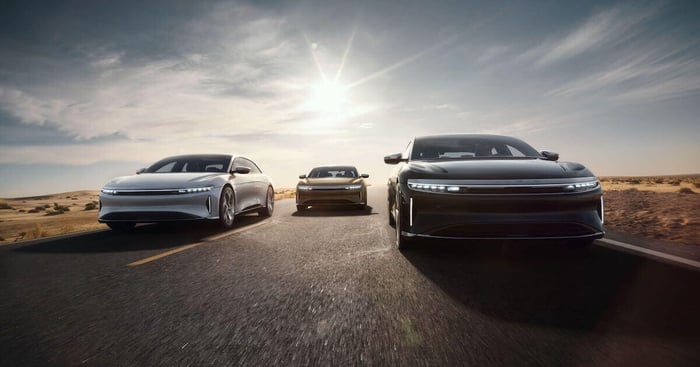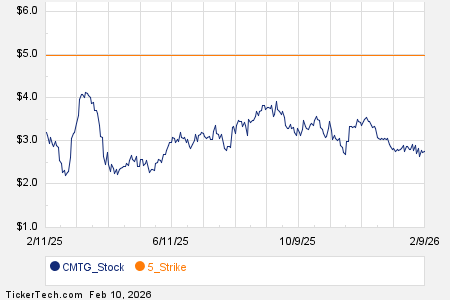Tesla Faces Brand Challenges as Lucid Group Gains Traction
Signs of Tesla‘s (NASDAQ: TSLA) brand crisis are evident across multiple fronts.
Over the weekend, more than 200 “Tesla Takedown” protests erupted nationwide, with Americans voicing their frustrations over CEO Elon Musk’s initiative to reduce federal agencies—an effort dubbed the Department of Government Efficiency (DOGE) by President Donald Trump—targeting his company directly.
Start Your Mornings Smarter! Wake up with Breakfast news in your inbox every market day. Sign Up For Free »
Sales Plummet and Recalls Pile Up
Sales figures paint a troubling picture for Tesla. Recent registration data indicates that sales across much of Europe dropped by 42% in the first two months of the year. Additionally, the U.S. National Highway Traffic Safety Administration (NHTSA) issued a recall impacting nearly all Cybertruck models due to safety concerns regarding a windshield panel that could detach while driving.
Lucid Group Seizes the Opportunity
In this challenging environment, one company appears poised to benefit from Tesla’s missteps. Sales for Lucid Group (NASDAQ: LCID), a manufacturer of luxury electric vehicles (EVs), are reportedly on the rise as potential Tesla buyers and current Tesla owners consider alternatives.
According to Electrek, a source for EV industry news, Lucid has noted a “dramatic uptick” in demand from former Tesla owners, who now represent 50% of its vehicle orders. Lucid CEO Mark Winterhoff shared in an interview with Fox Business that “negative feelings about Elon” and a lack of new models from Tesla have driven customers to Lucid.
Lucid, being significantly smaller than Tesla, is well-positioned to gain from this shift in consumer preference. Tesla’s sales reached 1.8 million vehicles in 2024 while Lucid managed to sell around 10,000 vehicles. A small decline in Tesla’s demand can significantly affect Lucid; even a 1% loss in Tesla’s sales translates to 18,000 potential customers looking for alternatives, which Lucid could capitalize on.

Several Lucid Air vehicles. Image source: Lucid Group.
Learning from History
Tesla’s predicament mirrors challenges faced by Uber Technologies, which experienced a backlash during the early days of the Trump administration that significantly affected its market share in favor of its rival, Lyft. Perturbation arose when Uber was perceived to be undermining a taxi driver strike protesting the “Muslim travel ban” at New York’s JFK airport. An ill-timed tweet from Uber about surge pricing sparked the “#DeleteUber” campaign, allowing Lyft to gain traction simply by providing a cleaner brand image.
While Uber did not intend to engage in the political discourse surrounding the protests, the brand suffered lasting effects from that episode, leading to a change in leadership and a permanent market share loss. Elon Musk, in contrast, has become much more involved in partisan conversations than anyone at Uber, increasing the likelihood of continued backlash against Tesla. This turmoil could provide additional advantages for Lucid and other EV competitors.
The Viability of Investing in Lucid
Given the current landscape, Lucid emerges as a viable option for disgruntled Tesla customers. Its models, including the Air sedan and Gravity SUV, are positioned as luxury offerings, starting at $69,900 and renowned for their impressive range. The Air won accolades such as the World Luxury Car of the Year in 2023 and has been recognized as the Best Luxury Electric Car for three consecutive years.
However, Lucid has encountered challenges in scaling production to meet demand. With only 10,000 vehicles sold, achieving profitability remains elusive. In 2024, Lucid reported revenue of $807.8 million but faced a negative gross profit of $923.1 million, implying significant losses on car sales before deducting overhead expenses. Overall, the company documented a GAAP net loss of $2.7 billion.
To succeed, Lucid needs to significantly ramp up production and aim for profitability while navigating Tesla’s brand challenges. Their goal for 2025 is to produce 20,000 vehicles, representing a bold expansion of manufacturing capacity. While the turmoil at Tesla may point investors toward Lucid, it is crucial to monitor the company’s production growth and timeline toward profitability.
Investment Considerations for Lucid Group
Before considering an investment of $1,000 in Lucid Group, potential investors should reflect on insights from the Motley Fool’s Stock Advisor analysts, who recently highlighted their own selection of the 10 best stocks—none of which included Lucid Group. The stocks they recommended have shown promise for substantial returns over the coming years.
For instance, Nvidia, included in their list on April 15, 2005, would have transformed a $1,000 investment into $676,774 by the time of the recommendation.*
The Stock Advisor service offers investors structured guidance for successful portfolio management through regular updates from experts and new stock selections monthly. The service has delivered impressive returns, outperforming the S&P 500 since 2002.*
*Stock Advisor returns as of April 1, 2025
Jeremy Bowman has no positions in the stocks mentioned. The Motley Fool holds positions in and recommends Tesla and Uber Technologies. They maintain a disclosure policy.
The views and opinions expressed herein are the views and opinions of the author and do not necessarily reflect those of Nasdaq, Inc.






